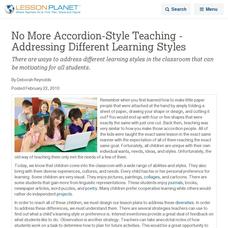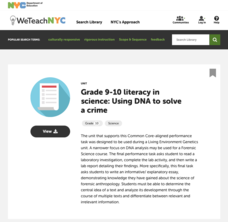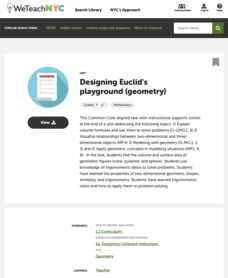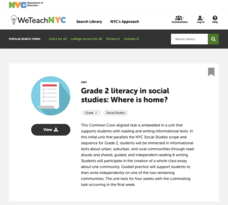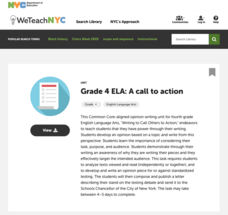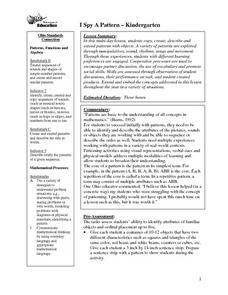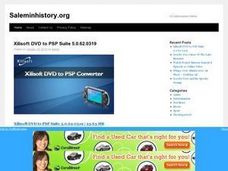Curated OER
No More Accordion-Style Teaching - Addressing Different Learning Styles
There are ways to address different learning styles in the classroom that can be motivating for all students.
MENSA Education & Research Foundation
Pi Day Fun!
In this multi-faceted introduction to pi, participants perform a bevy of pi-related activities. Ranging from measuring household items to singing pi songs and reading pi stories, this fun and non-intimidating resource serves to bring up...
Curated OER
Personal Learning Profile
Students investigate the life of Ghandi in order to find out how they learn. The choice of Ghandi was made because many students are not familar with him. Then student engage in different modalities of learning and take learning style...
Council for Economic Education
Athens and Olive Oil
Athens had olive oil—and lots of it! However, it needed wheat from the Egyptians. Understanding how societies get what they need through advantage and trade can be complicated. A scripted role-play exercise and in-class production...
American Battlefield Trust
Pre-1861: Disunion
Nat Turner, John Brown, and Abraham Lincoln all played a key role in the run-up to the bloody American Civil War. Using a PowerPoint, timeline activity, and essay prompt, young historians consider the roles of these men and more to...
Curated OER
Actors, Artists, Storytellers, and Poets
Twelfth graders in groups select a human rights issues and create a presentation that examines it through art, storytelling, poetry, or acting. The lesson helps students use different modalities of learning. Student personal expression...
New York City Department of Education
Peter’s Garden
Watch scholars' understanding of fractions bloom. The resource presents a performance task where the fractions are equal parts from the same whole, and mathematicians must use them to solve problems about a grade level garden. Teachers...
New York City Department of Education
Straw Rockets
Scholars become rocket scientists as they take off on a journey exploring Newton's laws of motion. After learning the laws of motion, pupils design their own investigations using straw rockets. They highlight their literacy skills in a...
New York City Department of Education
Grade 9-10 Literacy in Science: Using DNA to Solve a Crime
Scholars become detectives and use science to solve a crime! A complete unit introduces DNA and includes hands-on activities that have learners model DNA and extract it from different food types. A culminating activity challenges...
New York City Department of Education
Isabella’s Garden
Create rows and rows of vegetables. Pupils use their knowledge of multiplication to find the number of vegetable shoots planted in a garden and ways to arrange the vegetables in the performance task. Teachers use the suggested unit...
New York City Department of Education
Designing Euclid’s Playground
Create a geometric playground. Pupils work through a performance task to demonstrate their ability to use geometric concepts to solve everyday problems. The accompanying engineering design lessons show teachers how the assessment works...
New York City Department of Education
Grade 11 Literacy in Social Studies: Research Paper
The lesson guides young academics through the steps in producing a 10-page research paper on any topic in American history. Historians begin by formulating a thesis and gathering resources, then move on to creating an outline, and end...
New York City Department of Education
Grade 2 Literacy in Social Studies: Where Is Home?
What makes a community? How communities differ? Young scholars research different types of communities, small rural towns, and large crowded cities. They respond to writing prompts, and write essays in groups to understand the wide...
New York City Department of Education
Grade 4 Literacy in English Language Arts: A Call to Action
You have the power! Scholars learn that they have power of the pen in their writing. After reading and viewing various sources about standardized testing, they express their own opinions about the testing by writing letters to the...
New York City Department of Education
Grade 5 Literacy in English Language Arts: Should the School Day Be Longer?
Scholars read newspaper articles relating to a longer school day and complete note-taking organizers as they read. They then form opinions and complete outlines before writing essays supporting their point of view.
New York City Department of Education
Grade 5 Literacy: TCRWP Nonfiction Reading and Opinion/Argument Writing
Choose a side! Pupils watch and read several nonfiction resources about zoos. After gathering their research, they choose a side either for or against closing zoos. Scholars complete KWL charts, anticipation guides, flow charts, and...
Curated OER
The Aquatic Environment
Fifth graders focus on the various types of fish living in different water environments. In groups, they research the different methods used to fish and participate in experiments to determine the effects of mercury on fish, the...
Curated OER
Multiplication: Building Models, Representations and Explanations
First graders explore multiplication concepts through skip counting, repeated addition and arrays. Using animal characteristics as a context, 1st graders solve problems using mathematical tools such as hundreds charts, number lines, ...
Curated OER
I Spy a Pattern-Kindergarten
Students copy, create, describe, and extend patterns with objects. They explore a variety of patterns through the use of manipulatives, sound, rhythms, songs and movement. Cooperative processes are used to encourage partner discussion.
Curated OER
Salem's Maritime History: A History of our New Nation
Eighth graders examine the impact of Salem's maritime trade on America. Using primary source documents, they identify the use of expanding the number of products available and how it affected the economy. They write an essay discussing...
Other popular searches
- Learning Modalities
- Different Learning Modalities
- Learning Modalities Quiz
- English Learning Modalities


